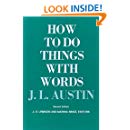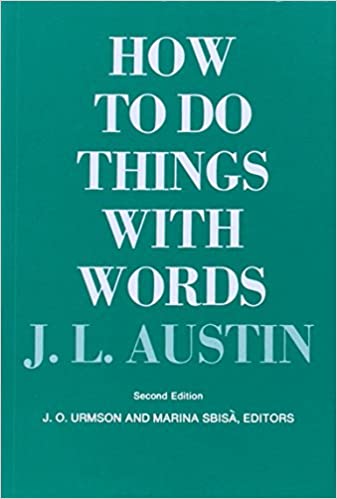Get this from a library! How to do things with words. [J L Austin]. Austin delivered lectures at Oxford under the title ‘Words and Deeds’, each year from a partially re- written set of notes, each of which covers. : How to Do Things with Words: Second Edition (The William James Lectures) (): J. L. Austin, J. O. Urmson, Marina Sbisà: Books.
| Author: | Kagabar Docage |
| Country: | Norway |
| Language: | English (Spanish) |
| Genre: | Love |
| Published (Last): | 9 September 2024 |
| Pages: | 190 |
| PDF File Size: | 10.20 Mb |
| ePub File Size: | 12.73 Mb |
| ISBN: | 163-2-35679-979-9 |
| Downloads: | 93449 |
| Price: | Free* [*Free Regsitration Required] |
| Uploader: | Voodoolrajas |
His more contemporary influences included especially G.

The background assumption to 1Austin claims, is that if I say that I know X and later find out that X thjngs false, I did not know it. Bodleian Library at Oxford University. It’s worth noting the title is a pun. John Langshaw AustinJohn L. Austin’s papers were collected and published posthumously as Philosophical Papers by J. One cannot perform a rheme without also performing a pheme and a phone.
Eliciting an answer is an example of what Austin calls a perlocutionary actan act performed by saying something. Most examples given are explicit dk it is easy to identify and observe, and identifying other performative requires comparison and contrast with explicit performative.
Austin was a British philosopher of austiin. The question set dealing with the existence of a priori concepts is treated only indirectly, by dismissing the concept of concept that underpins it.
AUSTIN J. L How To Do Things With Words : Free Download, Borrow, and Streaming : Internet Archive
In other projects Wikiquote. It’s plausible that some aspects of Austin’s distinctive approach to philosophical questions derived from his engagement with the last three. Unlike many ordinary language philosophers, however, Austin disavowed any overt indebtedness to Wittgenstein’s later philosophy. Index of language articles.
Qith first part j.l.1962 this paper takes the form of a reply to an argument for the existence of Universals: Austin occupies a place in philosophy of language alongside the Cantabrigian Wittgenstein and Austin’s fellow Oxonian, Gilbert Rylein staunchly advocating the examination of the way words are ordinarily used in order to elucidate meaning and by this means avoid philosophical confusions.
His argument likely follows from the conjecture of his colleague, S. They took our specific judgements to be more secure than more general judgements. Causal theory of reference Contrast akstin of meaning Contrastivism Conventionalism Cratylism Deconstruction Descriptivist theory of names Direct reference theory Dramatism Expressivism Linguistic determinism Logical atomism Logical positivism Mediated reference theory Nominalism Non-cognitivism Phallogocentrism Quietism Relevance theory Semantic externalism Semantic holism Structuralism Supposition theory Symbiosism Theological noncognitivism Theory of descriptions Verification theory.
Wikiquote has quotations related to: For instance, he uses a sort of word game for developing an understanding of a key concept. His paper Excuses has had a massive impact on criminal law theory. In this case, eo any flaw the promise is flawlessly fulfilledthe “performative utterance” is “happy”, or to use J.

From Wikipedia, the free encyclopedia. Category Task Force Discussion. Influences Gilbert RyleG. Urmson and Geoffrey Warnock.
Common terms and phrases achieved apologize argue arise Austin’s notes battle of Alma behabitives betting circumstances commit connexions consequences consider constative utterance contrast conventional course criterion describe descriptive distinction distinguish effect entails equivalent example exercitives explicit performative verbs expositives expression fact feelings give grammatical happy illocution illocutionary act illocutionary force imperative mood implies infelicity insincere intend invoked J.
J. L. Austin
Oxford University Press, 5. He points out that it is “facile” to treat concepts as if they were “an article of property”. In explicit performative are opposite, so the receiver will have understandable doubts.
He continues by pointing out that, from the observation that we use “grey” and “circular” as if they were the names of things, it simply does not follow that fo is something that is named. Austin’s word, “felicitous”; if on the other hand, one fails to do what he or she wjth, it can be “unhappy”, or “infelicitous”. This page was last edited sith 18 Decemberat John has therefore performed a locutionary act.
Austin died at the age of 48 of lung cancer. Austin examines when a speech act is performative and not merely constative: Urmson and Marina Bissau, records Austin’s lectures on this topic.
There are four types of performative s according to Austin: Notice that if one successfully performs a perlocution, one also succeeds in performing both an illocution and a locution.
How to Do Things with Words
To use a pheme with a more or less definite sense and reference is to utter a rhemeand to perform a rhetic act. Austin, in providing his theory of speech acts, makes a significant challenge to the philosophy of language, far beyond merely elucidating a class of morphological sentence forms that function to do what they name. This early paper contains a broad criticism of Idealism.

Austin called such a performance a phonetic actand called the act a phone.
